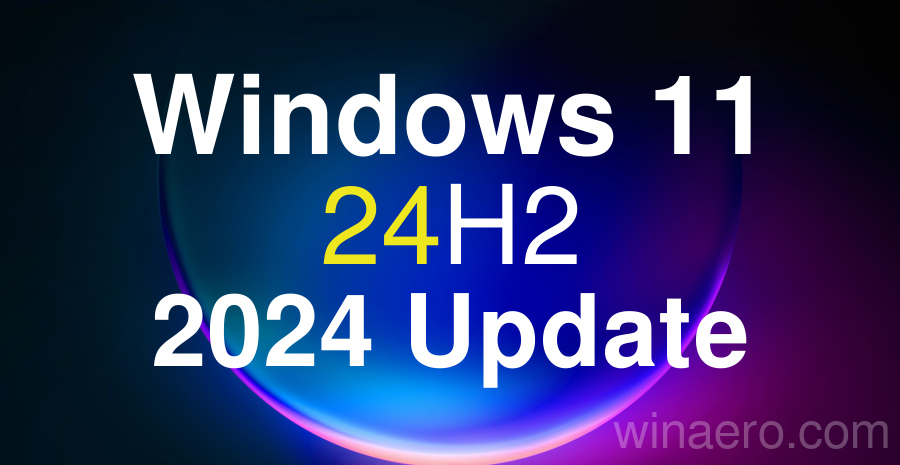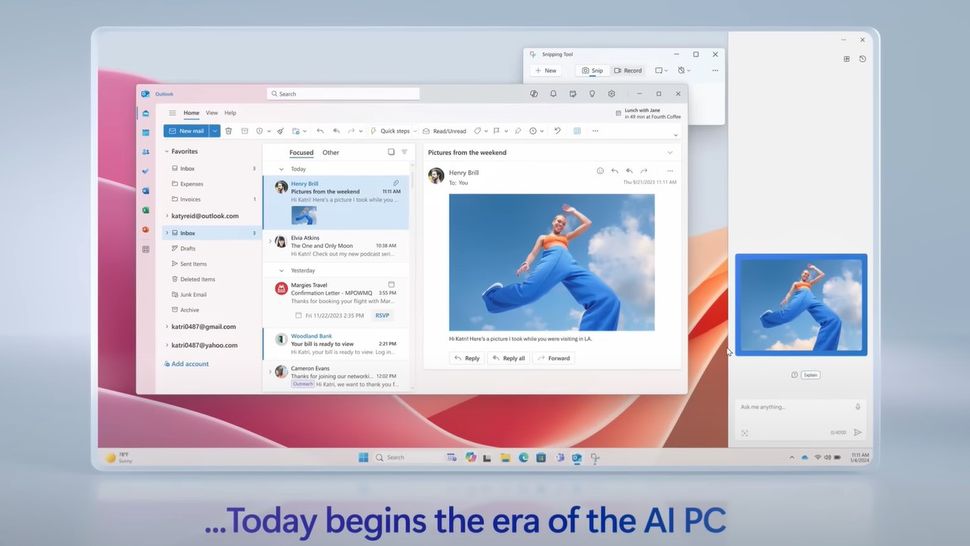2024 will mark a new era for Windows operating system, with "AI PCs" coming to the market in the near future. Major device makers in partnership with Microsoft will release a range of laptops and other computers packed with a neural processing unit to bring all the power of AI to users' fingertips. It's an opportune time to delve into the company's strategies and discuss the advancements in the upcoming version of Windows 11.
Advertisеment
Windows 11 24H2 roadmap
Microsoft is almost ready to sign the base platform build for the next version of Windows 11. So it will become available to OEMs in early April, which means they will be able to install it on new devices.

This stage is usually called RTM (Release To Manufacturers), although in modern realities this term has somewhat lost its original meaning. In the past, an RTM build was the final version of the operating system that was delivered to OEMs, partners, MSDN subscribers, and ultimately consumers on installation media. These days, it is just a stable version of the platform that lacks many planned features. This is how the Windows as a Service strategy works.
Although OEMs will receive the RTM build in April, work on Windows 11 version 24H2 will not be completed until late summer. This means Microsoft will have plenty of time to refine new features, including several unannounced AI features. They are expected to be announced at the event on May 20, 2024.
Note that this approach was already used before the release of Windows 11 in 2021. Back then, Microsoft unveiled the new operating system in June, released a base RTM build to OEMs and Insiders, and then updated that build over the summer to prepare Windows 11 for release in October.
But there is an important difference. This time, the rollout of Windows 11 version 24H2 will occur in two stages.
- In June, new devices with ARM Snapdragon X Elite processors running a new operating system will appear on the market, which will not have many of the features of the 24H2 version. Businesses cannot use older releases of Windows 11 because they are not compatible with the new processor.
- Windows 11 version 24H2 functionality is expected to be completed in July or August 2024. The signing of the final build of the next version of the OS is also scheduled for August.
- And in September, Windows 11 version 24H2 will begin to be distributed as a functional update for computers running Windows 11. New devices with Snapdragon X Elite processors will also receive an update that will add all the missing innovations to the system.
Now the schedule is as follows.
- April 2024: Windows 11 version 24H2 reaches RTM milestone.
- May 2024: Microsoft holds Windows event to unveil new AI experiences.
- June 2024: The first Arm-PCs with version 24H2 preloaded start shipping.
- July 2024: Microsoft finalizes feature set for Windows 11 version 24H2.
- August 2024: Microsoft signs-off on day-one feature patch for version 24H2.
- September 2024: Windows 11 version 24H2 + new AI features releases to everyone.
Obviously that Microsoft may change the dates.
AI Explorer
"AI Explorer" is the internal name for the key AI feature of Windows 11 version 24H2. It's described as an "advanced version of Copilot" that can track everything you do on your computer and let you find the data you need using natural language queries.

AI Explorer will have a timeline user interface that will let you see what actions have been performed on your computer over the past few days, and the results can be filtered. Artificial intelligence will document and organize all the information that appears on the screen, be it applications, texts, web pages, documents, photos, videos and much more.
The user will be able to use AI Explorer to search for almost everything that he did or saw on his computer. For example, the query “find the dinosaur photo that Sarah sent to me on WhatsApp” will find the specific point in time when that image was sent.
Also, AI Explorer (if open) can analyze the information on the screen and suggest actions based on the available information. For example, when viewing an image on a web page or application, it may suggest you to remove the background from the photo with Paint.
Fortunately, users will be able to manually disable AI Explorer due to logical privacy concerns, for example. But based on the available information, AI Explorer will store and process data on the local device without sending it to Microsoft servers. So the feature will work even without an Internet connection.
Live captions
In addition, Microsoft is working on an update to the Live Captions feature, which will get the ability to translate subtitles into other languages in real time. The feature will appear in the Quick Settings menu on the taskbar by default, as Microsoft expects it to be of interest to more users this way.
Generative AI will run locally
Windows 11 has introduced several generative AI features in recent months, including the ability to generate images in Paint, background removal and blurring in Photos, and Copilot for Windows itself. Currently these tasks are processed in the cloud, but this is set to change in 24H2.
On devices with a hardware NPU (neural processing unit), it is expected that some generative functions will be performed locally without connecting to the cloud. This will first be available in Copilot, which will speed up basic queries and reduce dependence on Microsoft servers. At the same time, Copilot will retain the ability to connect to the cloud if necessary.
Microsoft also intends to implement Copilot-based text generation functions in applications such as Notepad and Phone Connectivity (for SMS). Now a similar implementation is already present in Word and Outlook.
Windows on ARM
In early 2024, Microsoft announced that it intended to turn Windows into an AI-enabled platform this year. But it's also an important year for Windows on ARM.
Qualcomm has finally managed to create a powerful desktop ARM processor that can compete with Apple's solutions in terms of performance and energy efficiency. Microsoft is so confident in the Snapdragon X Elite that it intends to release new consumer Surface Pro and Surface Laptop models exclusively based on ARM chips. The announcement of new products will also take place on May 20, 2024.
Dell, HP, Lenovo and many other OEMs are ready to start selling devices with Snapdragon X Elite and Windows 11 version 24H2 pre-installed. They will be perfect for new AI functions in Windows, since the most powerful NPU units are in chips from Qualcomm.
Support us
Winaero greatly relies on your support. You can help the site keep bringing you interesting and useful content and software by using these options:
